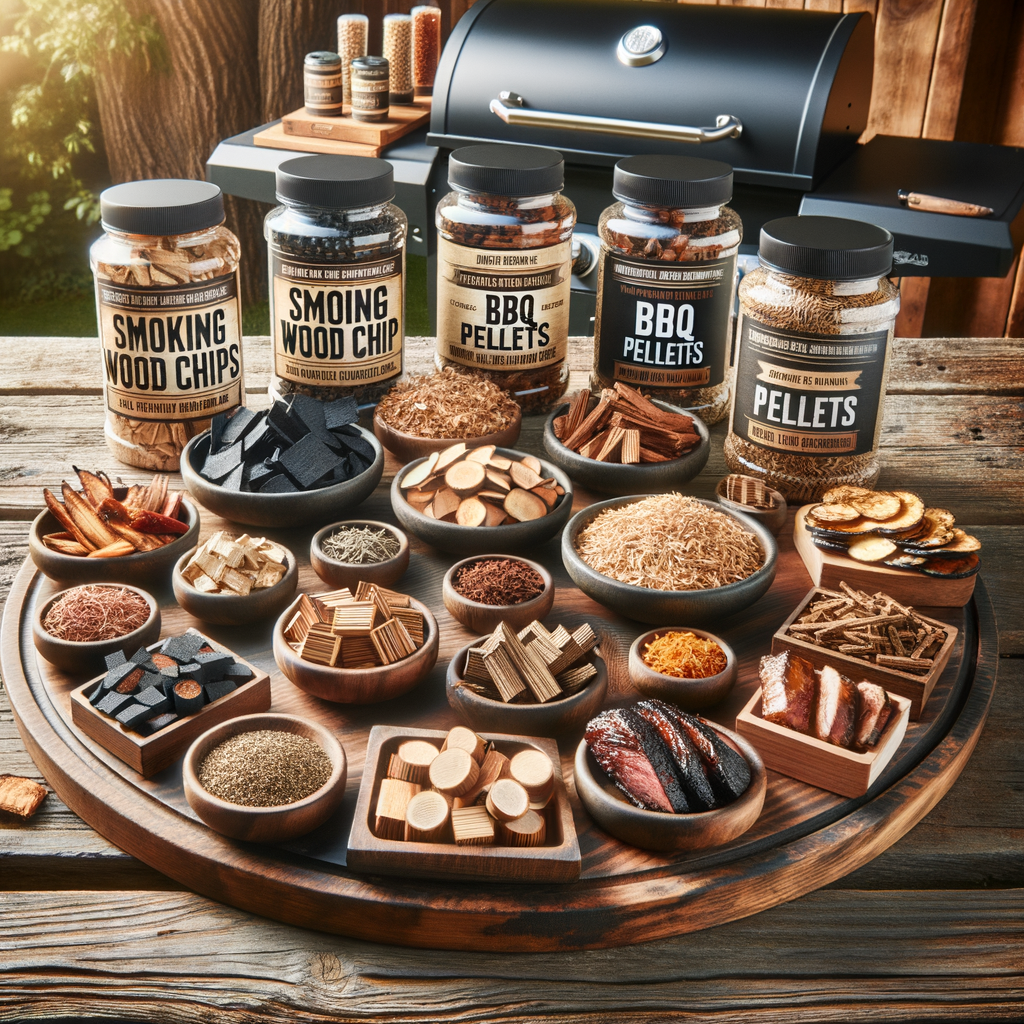
Introduction to BBQ Flavor Enhancers
When it comes to barbecuing, the flavor is everything. The right combination of heat, smoke, and seasoning can transform a simple piece of meat into a mouthwatering meal. One of the key components in achieving this culinary magic is the use of flavor enhancers. Let’s dive into the world of BBQ flavor enhancers and discover how they can elevate your grilling experience.
- Understanding the Importance of Flavor Enhancers in BBQ
Flavor enhancers are substances that intensify the taste of food. In BBQ, they play a crucial role in adding depth and complexity to the flavors. They can be as simple as salt and pepper or as unique as applewood chips for smoking. The right flavor enhancer can make your BBQ stand out and leave your guests asking for more.
Flavor enhancers work by interacting with the food’s natural flavors. For example, salt can enhance the natural sweetness of a piece of meat, while a smoky flavor enhancer can add a rich, earthy taste. By understanding how different flavor enhancers work, you can experiment with different combinations and create your own unique BBQ recipes.
- Overview of Different Types of BBQ Flavor Enhancers
There are many different types of BBQ flavor enhancers, each with its own unique properties and uses. Here are a few of the most popular ones:
| Flavor Enhancer | Description |
|---|---|
| Wood Chips | Wood chips are used in smoking to impart a specific flavor to the meat. Different types of wood, like hickory, apple, or mesquite, produce different flavors. |
| BBQ Rubs | BBQ rubs are mixtures of spices that are rubbed onto the meat before cooking. They can add a wide range of flavors, from sweet and spicy to savory and smoky. |
| BBQ Sauces | BBQ sauces are used to baste the meat during cooking or as a dipping sauce. They can be sweet, tangy, spicy, or a combination of these flavors. |
| Marinades | Marinades are liquids in which the meat is soaked before cooking. They not only add flavor but also tenderize the meat. |
Each of these flavor enhancers can be used alone or in combination to create a wide variety of delicious BBQ dishes. By experimenting with different types and combinations of flavor enhancers, you can create your own unique BBQ style.
Smoking Wood Chips: Enhancing Flavor with Wood
When it comes to barbecuing, the secret to a flavorful meal often lies in the smoke. And the smoke’s flavor? That comes from the wood chips. Let’s delve into the world of smoking wood chips and learn how to choose the right ones for your BBQ.
Choosing the Right Wood Chips for Smoking
Choosing the right wood chips for smoking is a crucial step in achieving the perfect BBQ flavor. It involves understanding the different types of wood chips and matching them to different types of meat. Let’s break it down:
- Understanding the different types of wood chips
- Matching wood chips to different types of meat
- Beef: Hickory and mesquite wood chips work well with beef due to their strong flavors.
- Poultry: Apple and cherry wood chips are a great match for poultry, as their sweet, mild flavors don’t overpower the meat.
- Pork: Apple wood chips are a popular choice for pork, adding a sweet, fruity flavor that complements the meat well.
There are several types of wood chips available, each imparting a unique flavor to the smoke. Here are a few common ones:
| Wood Type | Flavor Profile |
|---|---|
| Hickory | Strong, smoky flavor |
| Apple | Sweet, fruity flavor |
| Mesquite | Intense, earthy flavor |
| Cherry | Mild, sweet flavor |
It’s important to experiment with different wood types to find the flavor profile that suits your taste buds best.
Once you understand the different types of wood chips, the next step is to match them with the right type of meat. Here are some general guidelines:
Remember, these are just guidelines. Feel free to mix and match to discover your own perfect flavor combinations!
Grilling with Wood Chips: Techniques and Tips
Grilling with wood chips can take your barbecuing to the next level. It’s not just about the heat; it’s about the flavor. Wood chips add a unique, smoky flavor to your food that can’t be replicated with charcoal or gas alone. But, like any cooking technique, it requires some know-how. Let’s delve into the art of grilling with wood chips.
- How to properly use wood chips for grilling
- Common mistakes to avoid when grilling with wood chips
Using wood chips for grilling is not as simple as throwing them on the fire. The first step is to soak your wood chips in water for about 30 minutes to an hour. This helps them to smolder and produce smoke rather than burning up quickly.
After soaking, drain the chips and place them in a smoker box or wrap them in a foil pouch with holes poked in the top. This allows the smoke to escape and flavor your food. Place the box or pouch directly on the grill grates over the heat source. Once the chips start smoking, you’re ready to grill your food.
Remember, different types of wood chips impart different flavors, so choose wisely based on the type of meat you’re grilling. For example, applewood chips pair well with chicken and pork, while mesquite chips are great for beef.
Grilling with wood chips can be a game-changer, but it’s easy to make mistakes. One common error is using too many chips. More isn’t always better. Overloading your grill with wood chips can result in too much smoke, which can give your food a bitter taste.
Another mistake is adding the chips too early or too late. You want to add your wood chips when your coals are hot and ready. If you add them too early, they’ll burn up before your food gets on the grill. If you add them too late, your food won’t have enough time to absorb the smoky flavor.
Lastly, remember to keep the grill lid closed as much as possible to keep the smoke in and ensure your food gets that delicious smoky flavor.
Grilling with wood chips is an art. It takes practice, but once you master it, you’ll be amazed at the flavor it can add to your food. So, grab your grill, some wood chips, and get cooking!
BBQ Pellets: An Alternative to Charcoal
When it comes to grilling, many people default to using charcoal. However, BBQ pellets offer an exciting and flavorful alternative. Let’s delve into the world of BBQ pellets and explore how they can elevate your grilling experience.
Using Pellets for Grilling: A Comprehensive Guide
Using BBQ pellets for grilling may seem intimidating at first, but with a little knowledge and practice, it can become second nature. Here’s a step-by-step guide to help you understand the benefits and proper usage of BBQ pellets.
- Understanding the benefits of using BBQ pellets
- How to properly use BBQ pellets for grilling
BBQ pellets have several advantages over traditional charcoal. First, they are made from compressed sawdust, which means they burn cleaner and produce less ash. This makes cleanup easier and reduces the environmental impact. Second, BBQ pellets come in a variety of flavors, such as hickory, apple, and mesquite, allowing you to experiment with different tastes. Lastly, BBQ pellets provide a consistent heat source, ensuring your food cooks evenly.
Using BBQ pellets is straightforward. Start by filling the pellet hopper of your grill. Turn on the grill and set it to the desired temperature. Once the grill reaches the set temperature, place your food on the grates. Remember to check the pellet level occasionally and refill as needed. After grilling, allow the grill to cool completely before removing any remaining ash. Always store your BBQ pellets in a dry place to keep them in optimal condition.
Switching to BBQ pellets can enhance your grilling experience by providing unique flavors and a cleaner burn. So why not give it a try on your next BBQ session?
Best Flavor Enhancers for BBQ: Why Choose Pellets?
When it comes to enhancing the flavor of your BBQ, there are many options to consider. One of the most effective and increasingly popular choices is BBQ pellets. But what makes them stand out from other flavor enhancers? Let’s dive into the details.
- Comparing BBQ pellets to other flavor enhancers
- Case study: The impact of BBQ pellets on flavor
BBQ pellets are a unique flavor enhancer compared to traditional options like charcoal and smoking wood chips. They are made from compressed sawdust and are available in a variety of wood types, allowing you to customize the flavor of your BBQ to your liking. Unlike charcoal, which can sometimes give a harsh flavor, BBQ pellets provide a smoother and more consistent taste. They also burn cleaner and longer than wood chips, making them a more efficient choice.
Let’s take a look at a case study to better understand the impact of BBQ pellets on flavor. A group of BBQ enthusiasts conducted an experiment where they cooked the same cut of meat using different flavor enhancers: charcoal, wood chips, and BBQ pellets. The results were quite revealing.
| Flavor Enhancer | Taste | Efficiency |
|---|---|---|
| Charcoal | Harsh, Smoky | Low |
| Wood Chips | Varied, Depending on Wood Type | Medium |
| BBQ Pellets | Smooth, Consistent | High |
The BBQ cooked with pellets was found to have a smoother and more consistent flavor compared to the other methods. The taste was also customizable based on the type of wood the pellets were made from. In terms of efficiency, BBQ pellets burned longer and cleaner than both charcoal and wood chips.
In conclusion, BBQ pellets offer a unique combination of flavor enhancement, efficiency, and customization that sets them apart from other options. So, the next time you’re planning a BBQ, consider giving BBQ pellets a try. You might be surprised at the difference they can make!
Charcoal Alternatives: Exploring Other Options
As BBQ enthusiasts, we are always on the lookout for ways to enhance our grilling experience. One area that often comes under scrutiny is the type of fuel we use. Traditional charcoal has been the go-to for many years, but it’s not without its drawbacks. Let’s explore some alternative options for BBQ.
Alternative Charcoal Options for BBQ
- Understanding the Drawbacks of Traditional Charcoal
- Exploring Alternative Options to Charcoal
- Wood Chips: Wood chips are a great way to add flavor to your BBQ. They come in a variety of types, each imparting a unique flavor to your food.
- BBQ Pellets: BBQ pellets are made from compressed sawdust and offer a more consistent temperature than charcoal. They also produce less ash, making cleanup easier.
- Electric Grills: For those who want to avoid the mess and smoke altogether, electric grills are a viable option. They heat up quickly and offer precise temperature control.
Traditional charcoal, while popular, has several disadvantages. Firstly, it produces a lot of smoke, which can be harmful to the environment and your health. Secondly, it can be difficult to control the temperature, leading to uneven cooking. Lastly, the ashes left behind after grilling can be messy and hard to clean up.
Given the drawbacks of traditional charcoal, it’s worth considering other options. Here are a few alternatives:
In conclusion, while traditional charcoal has its place in the BBQ world, there are several alternatives worth considering. By exploring these options, you can enhance your grilling experience and potentially make it healthier and more environmentally friendly.
BBQ Techniques with Pellets and Other Charcoal Alternatives
When it comes to barbecuing, the type of fuel you use can significantly impact the flavor of your food. Traditional charcoal has been a popular choice for many years, but there are other alternatives that can provide a unique and delicious taste. Let’s explore how to adapt BBQ techniques for these charcoal alternatives and enhance your BBQ flavor.
- How to adapt BBQ techniques for charcoal alternatives
- Key takeaways: Enhancing BBQ flavor with charcoal alternatives
Adapting your BBQ techniques for charcoal alternatives like pellets, lump charcoal, or even coconut shells is not as daunting as it may seem. The key is to understand the heat output and flavor profile of your chosen alternative.
Pellets, for example, burn cleaner and hotter than traditional charcoal. This means you may need to adjust your cooking times and temperatures. Lump charcoal, on the other hand, imparts a smoky flavor that can enhance certain types of meat. Coconut shells are a sustainable option that provides a subtle, sweet flavor.
Regardless of the alternative you choose, always start with a small amount and adjust as necessary. Remember, you can always add more, but you can’t take it away once it’s burning.
Charcoal alternatives can significantly enhance the flavor of your BBQ. Here are some key takeaways:
| Charcoal Alternative | Flavor Profile |
|---|---|
| Pellets | Clean, hot burn with a variety of wood flavors available |
| Lump Charcoal | Smoky flavor, burns hotter and faster than traditional charcoal |
| Coconut Shells | Subtle, sweet flavor, sustainable option |
Remember, the key to a successful BBQ is experimentation. Don’t be afraid to try different charcoal alternatives and adjust your techniques as necessary. With a little practice, you’ll be able to create a BBQ that’s uniquely your own.
Conclusion: Spice Up Your BBQ!
As we wrap up our flavorful journey, let’s take a moment to reflect on the key takeaways. BBQ isn’t just about grilling meat; it’s an art that involves enhancing the taste with the right flavor enhancers.
- Recap of the importance of flavor enhancers in BBQ
- Final thoughts on using wood chips, pellets, and charcoal alternatives
Flavor enhancers play a pivotal role in BBQ. They add depth and complexity to the taste of your grilled food, making it more enjoyable and memorable. Whether you’re using wood chips, pellets, or charcoal alternatives, remember that each has its unique flavor profile and burning characteristics. It’s all about experimenting and finding what works best for your palate and the type of food you’re grilling.
Wood chips are a fantastic way to introduce smoky flavors into your BBQ, with different types of wood offering various flavor profiles. BBQ pellets, on the other hand, are a versatile and convenient alternative to charcoal, providing consistent heat and a range of flavors. Charcoal alternatives like coconut shells and briquettes are also worth exploring, especially if you’re looking for a more eco-friendly option.
In conclusion, BBQ is more than just a cooking method; it’s a culinary adventure that allows you to experiment with different flavors and techniques. So, don’t be afraid to spice up your BBQ with different flavor enhancers. Remember, the goal is not just to feed, but to wow your guests with an unforgettable taste experience.






